The History of Zimbabwe is one of violence and WAR: Therefore our country is in great need of reconciliation and PEACE!
The people of Zimbabwe remember that their country was built on a foundation of warfare and violent politics. The Ndebele Nation in the south east of Zimbabwe cannot forget their ancestors who were related to the Zulus (or “Chaka the Zulu”). They crossed the Limpopo River and settled in what later became Zimbabwe. Even today the Ndebele speaking Zimbabweans remember very well that their ancestors were engaged in a long drawn-out conflict with their Shona-speaking neighbors. They remember that the Ndebele married their daughters who became their “varoora” (daughters-law) and they themselves became their “vanatezvara”(fathers-in-law).
The Matabele and Mashona know that Zimbabwe is divided ethnically. This has caused conflicts and bitter antagonism.
Even the War of liberation had to deal with this split, and the fighting forces were divided. War and Violence are an inheritance, which is still disturbing the country.
When the war came to an end, violence still continued in one way or another. The new overlords of Zimbabwe knew that they had gained control over the country and its people through the gun. The former president kept saying that the gun, not the ballot, gave them the power to rule. The democratic vote was regarded with suspicion by the new elite in control of the country. The country was given a democratic constitution. Elections were held at regular intervals, but the results were often ignored and they did not produce a legitimate government.
The “ruling party” under a leader who claimed absolute power, or a government that was led by a prime minister who had similar authority, considered that their respective regimes (and/or the “ruling party”) could not be removed from power now or ever in future. Any attempt to bring about a “regime change” was considered (and still is) a criminal offense.
The “War of Liberation” had not brought about freedom, the vote for all citizens or a free choice about who was to govern and rule the country. At the end of the war the weapons were buried in the ground and marked to be excavated if needed in some renewed violent conflict. Violence could never be ruled out as a means of power politics. The number of ex-fighters who lost their lives in similar violent encounters, in campaigns to eliminate enemies or annihilate political opponents has never been established accurately. Massacres became tools of postwar consolidation of political power or military superiority. The most cruel campaign to do away the political or ethnic enemy was “Gukurahundi” which probably killed ca. 20 000 rural people or villagers who refused to support the “ruling party” at elections. The justification given was always that the “rebels” wanted to undo the “revolution” (“Break the Silence – Rebuild the country, Catholic Commision for Justice and Peace, Lawyers….) The people of Zimbabwe remember that their country was built on a foundation of warfare and on political violent. The Ndebele Nation in the south east of Zimbabwe cannot forget their ancestors who were related to the Zulus (or “Chaka the Zulu”). They crossed the Limpopo River and settled in what later became Zimbabwe. Time and again there were violent clashes, fights and shootouts. Civilian victims were frequent.
President Mugabe was repeatedly asked what he thought of “Gukurahundi”. This cruel campaign was not just an invention of the army units directly involved in the cruel and violent military action against civilians. It was actually a campaign that involved Korean military units specially trained for the Zimbabwean civil war which the country could not sort out just by itself. Mugabe never admitted any guilt in the atrocities, raping, murders and terror in general. He had a very simple answer to the questions put to him. “It was a moment of madness”. He clearly did not accept any guilt or responsibility. He accepted that it was an event (or rather campaign) which went far beyond any rational action. He tried to tell people that it should never have happened. But he did not regard it as a mere incident. He played it down. He never asked for forgiveness from his Zimbabwean fellow citizens that he was responsible for great cruelty and inhumanity. He did not try to defend it. But he knew that he had inflicted untold misery and pain on countless Zimbabweans, many of whom had made enormous sacrifices in the war for liberation and the building of a new country.
Robert Mugabe, when he was still President, used to say that he had “degrees” in violence. This was to terrify the public by claiming that he would be ruthless in the use of violence.
He called it “A Moment of Madness”, and indeed it was. He insisted that this horrible war was the only means he had to defeat his enemies who wanted by all means to keep the ruling party, the president and all his war allies in power. He did not try to explain or excuse this. He tried to tell the people of the country that he had no choice. He saw himself compelled to follow this course, despite all the blood and pain that it cost. Of course, it was more than a “moment”. It took a long time and demanded blood and sacrifice. It never ended. This excruciating pain affected body and soul.
The War (Chimurenga) was supposed to bring freedom, prosperity, and progress to the people of this warn-torn country. But in fact they were thrown on that heap of rubbish called “Operation Murambatsvina” when urban shacks and other dwellings were bulldozed and destroyed, without providing the people deprived of any dwellings with alternatives. “Murambatsvina” means “getting rid of rubbish”. It was referring to Slum areas which were full of rubbish and people who had to be removed, because their presence seemed to be intolerable human waste and refuse. Some destitute people who were thus removed from the scene of “Murambatsvina” said: that “rubbish and refuse” that is us!”
Clearly, the victims of this “clear-up campaign” felt that they had been deprived of any human dignity! They may not have been discarded like rubbish and refuse, they were perhaps not injured or starved, let alone killed. But they had not been given the respect which they deserved.
The people who were thus deprived of their human dignity paid a terrible price which they may not even have known at the time it happened. The cynicism of the leaders and the utter contempt in which they held their fellow citizens will not be forgotten so soon. Churches, parties, unions and any other political forces were not accepted as long-term players in the political game. They only accepted political forces with whose strategies they agreed as being in line with their own long-term strategies. Moral, spiritual, traditional forces they dismissed as useless for the building of a new democratic state. Political agents without respect for spiritual and moral authorities were only respecting sheer violence and warfare as a tool of nation-building.
President Mugabe made it clear many times that he had little respect for the moral authority of the Church (even though he let it be known that he considered himself a practicing Christian and a Catholic). Where did he feel at home and whom did he respect as a nation-builder at a time when few people submitted to the authority of genuine leaders?
“In Zimbabwe, many victims and survivors of gross violations of human rights are not reconciled. Past trauma remains unhealed. Injustice go back to pre-independence times. Since Independence the tragedy of Gukurahundi remains an unacknowledged shadow. The first decade of the Third Millennium was plagued by violence associated with land redistribution, urban displacement (Operation Murambatsvina) and political elections. Processes of acknowledgment, reparation, forgiveness, truth-telling, healing and assurances of non-recurrence , etc. are required as stepping stones for reconciliation and sustainable peace.
It cannot be left to a constitution-driven process only to provide reconciliation in society. Churches are a central part of civil society. The ongoing reconciling work must complement – I need go before and after – the work of the civil Commission. At the heart of the churches ‘mission is the ministry of reconciliation which must be fostered whether a state process exists or not.” (Alberts S Hororo The Long Awaited dawn, P. 182).
Reconciliation requires that the parties that were engaged in a battle and remain antagonistic to each other, admit that they have done great harm to their country and its people, and that they must live from now on in peace.
“The question is: how can we engage and still be true to our prophetic message? It is cowardice if not irresponsibility to say that we should not engage because the ruling party or the government has failed to listen in the past. What are we doing to make them listen? If the church is too weak to make the government take it seriously, then this is the problem that must be addressed. A prophetic church must be a strong church. The church in Zimbabwe can engage the ruling party and the state without compromising its prophetic mission if it combines the prophetic idealism of the three mother bodies ( Zimbabwe Council of Churches, Evangelical Fellowship of Zimbabwe, The Zimbabwe Catholic Bishops’ Conference – ZCBC). We need to combine the insight and caution of the Christian Alliance with the boldness of the three mother bodies…………(A Hororo, The long Awaited Dawn, p. 186).
Participatory Democracy Is the Answer to our History of Violence
By Fr Oskar Wermter SJ, from: Prophetic Witness in Zimbabwe, Critical Voices emerging in Times of Crisis, Femhouse, 96 ff.
Zimbabwe needs to make a clean break with its history of violence and resolutely walk the road of peace by creating a constitutional state, guaranteeing a participatory democracy and promoting respect for the rule of law.
Civilised people associate torture chambers with the ‘dark ages’ and the rack with a time when witches and heretics were burnt at the stake.
We no longer deliberately and systematically inflict maximum pain on fellow human beings by beating and burning, stretching and strangulating them. Or so some of us naively think.
…..Independence should have put a stop to such acts of inhumanity. It didn’t. …..
I keep meeting people in town who dare not go back to their rural homes where they have been tortured and might get the same cruel treatment again. An old parent is waiting for them, and they would love to go, but the memory is too raw and painful ( 96 – 108).
Whenever the Mugabe regime (ruling party) meets opposition they automatically resort to violence which gave them power in the past and which will, they trust, keep them in power now.
The Church values the democratic system inasmuch as it ensures the participation of citizens in making political choices, guarantees to the governed the possibility of electing and holding accountable those who govern them, and replacing them through peaceful means when appropriate (Pope John Paul II, 1991).
We must honour those tortured, raped, killed as victims of political oppression by creating constitutions and laws that will not allow human dignity to ever be trampled upon in Africa again” (Prophetic Witness, p. 104).
There was a long line of voters waiting for their turn to cast their ballot. An official walked up and down the line and admonished the voters, “Make sure you do not make the mistakes those voters made at the previous election. …you know what happens to voters who vote “wrongly”.
Election officials are held personally responsible for the balloting at their voting center to run smoothly, without any votes to be dropped into a “wrong” ballots box. The officials have no sense of humor and will punish “wrong voters”. There is terror, intimidation, and threatening language. The voters, especially in a rural area or a remote village, are shaking in case they have incurred the anger or wrath of the officials. The voters tremble with fear.
Waiting at your ballot box is no joke. It is a serious matter. People who were caught having “voted wrongly” tremble with fear. There are policemen who do not hesitate to grab suspicious characters and take them away for a lesson in the bush. They beat and torture them,”If you do that again, we give you an even more painful beating next time. No “wrong voter” will forget such a warning and threatening language.
The political leaders want to win the elections at all costs; they will beat fear and terror into their voters, and will not tolerate people spoiling the vote. They will not hesitate to take them for a beating into the bush.
No one is immune or safe. Neither men nor women. The police, soldiers or security men are all being treated with the same anger. All have reason to show great anxiety and fear. Women may be treated with the same brutality as the men.
There is fear and trembling. Women may show even greater fear. Politicians are no gentlemen. They only know power and do not hesitate to spread fear and terror.
Citizens should try and protect each other, but especially the weak, the poor and the sick, the feeble and the frail.
There is fear and anxiety. Maybe we want to flee and seek shelter. But there is a trusted friend and companion with us on our way. Fear should not be our final word.
There is fear and anxiety. But there is also trust and confidence. We can be reconciled and find peace. We have not been abandoned. We can trust and find our way even when we felt lost and unable to find our way back to where we came from. There is terror and trembling, but there is also a path we know and can rely on.
“This is not deceptive, because the Love of God has been poured into our hearts by the Holy Spirit which has been given us.” (Romans 5 : 1 – 2; 5 – 8)
“FIRST WE MUST BE RECONCILED WITH ONE ANOTHER, AND THEN WE CAN BE RECONCILED WITH EVERYONE ELSE” (Matt 5: 24)
Reconciliation needed after so many Wars and Violence.
This we must learn in our communities, parishes and dioceses.
By Fr Oskar Wermter SJ

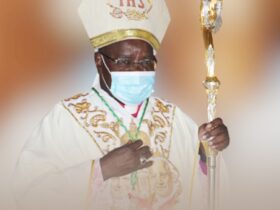
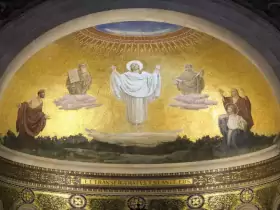
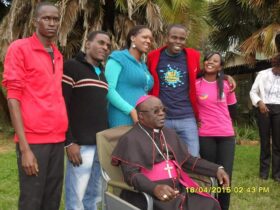
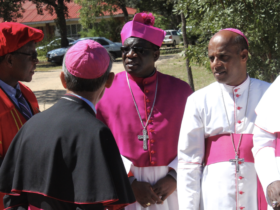

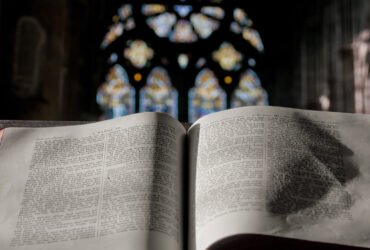

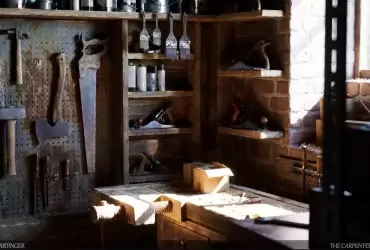
Leave a Reply